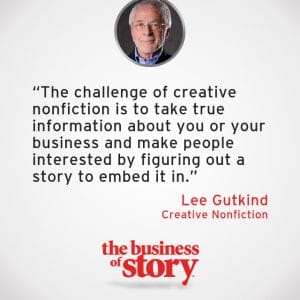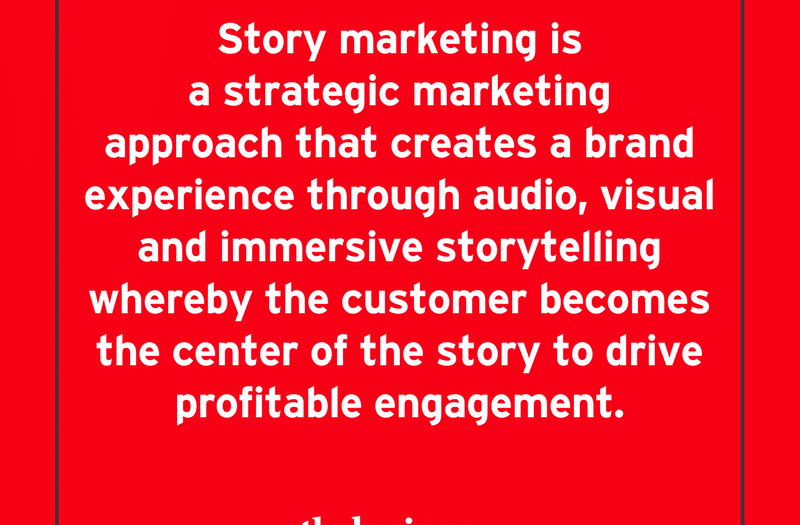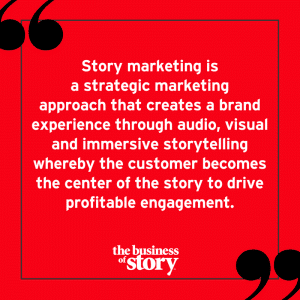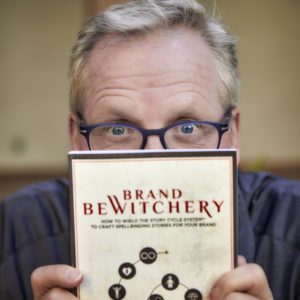How to place story marketing at the core of your content strategy
It was the summer of 2006. I was standing in the middle of the convention floor in Anaheim, CA, producing the product launch segment for Forever Living Products’ annual Super Rally. More than 3,000 sales executives from over 130 countries surrounded me.
Then the video introducing Forever’s new Multi-Maca product flickered to life on the ballroom screen. The gathering quieted as all eyes turned to the stage.
I was in the crowd to gauge how an audience, the bulk of which spoke very little English, would respond to our little story. Given the language barrier, we hoped to hit on some universal themes and rely on visual storytelling as much as the narrative to engage the distributors.
The place erupted with our first visual metaphor for the hero’s dysfunction: a universal “get.” And laughter crescendoed as the story played on.
We didn’t focus on features and functions. We went for the heart with humor. The audiences loved it, and the product sold out directly following the launch.
I was struck by the power of story marketing on a universal stage. Done right, stories connect human beings, no matter their race, religion, or region, on a visceral level through shared beliefs and values.
Features and functions don’t.
Story marketers know that people don’t buy what you make. They buy what you make happen. And you share those outcomes through stories your customers can relate to.
Story marketing is a strategic marketing approach that creates a brand experience through audio, visual and immersive storytelling whereby the customer becomes the center of the story to drive profitable engagement.
Here’s how some of the brightest story marketers do it.
The seven habits you can master to become a highly effective story marketer:
-
Story marketers place their audience at the center of the story
We all live vicariously through the protagonists in the stories we love. That’s why story marketing masters create or feature characters that their audience can relate to. The brand is not the hero of the journey, the customer is. The brand plays a vastly more important role in the story as the customer’s mentor or guide.
I thought the Bud Light Between Friends spot for Super Bowl 51 did an excellent job of allowing the viewer to live vicariously through its hero. I chuckled at many of the tiny stories throughout the montage because I could relate to them. The commercial creators allowed me to complete each story niblet in my mind as I connected many of the micro-events to buddy milestones in my life.
INSIGHT: Know your audience in a God-like way, then reveal them in your stories.
-
Story marketers think in scenes
 Shit happens. That’s where the story is. So if you’re writing a post, creating a white paper, presenting a powerpoint, or communicating anything that must persuade an audience, write it as a scene or scenes. Because scenes insert action into your content.
Shit happens. That’s where the story is. So if you’re writing a post, creating a white paper, presenting a powerpoint, or communicating anything that must persuade an audience, write it as a scene or scenes. Because scenes insert action into your content.I learned this from Lee Gutkin, founder of the literary magazine Creative Nonfiction: True Stories Well Told and author of You Can’t Make this Stuff Up. Lee was a guest on the Business of Story podcast where he guided listeners through how to think in scenes and then build your stories around them.
INSIGHT: Scenes bring action and infuse energy to otherwise mundane content.
-
Story marketers capture a moment
Every story has a moral or truth to it. You find the truth in that singular moment the entire story revolves around. You can capture that moment in something as simple as a tweet like Bacardi did here.
Eric Munn, the creative Director of Onion Labs, the in-house content division of The Onion, America’s most trusted media empire for hilarious fake news, appeared on this edition of our podcast to talk about capturing those brand moments through humor.

INSIGHT: Moments can bring a meaningful truth to your stories that connect with your audiences, even in fun and humorous ways. -
Story marketers use powerful characters
You don’t have to look any further than Dos Equis’ Most Interesting Man in the World. And given their new, younger version of him, you can see how difficult it can be to find and create compelling characters.
INSIGHT: Our minds are captivated by irresistible characters that you can live through.
-
Story marketers establish compelling stakes
What’s in it for your audience? If you want your customers to live vicariously through your brand stories, then give them something compelling to go after. I think the new Current Mediation studio in Phoenix, AZ is doing a nice job of helping the harried understand what’s at stake for their mental fitness and what they can do about it. And I’m proud to make the full disclosure that the Current Meditation brand is built from our Story Cycle system.

INSIGHT: Give them something to go after in your brand stories. -
Story marketers create uncertain outcomes
Sprint did a beautiful job of setting up an uncertain outcome when a dad pushes his car over a cliff to fake his death in front of his kids. And then they pay it off with the surprise line that made me laugh out loud during Super Bowl LI: easily, my favorite storyline of the night. I won’t give it away, you’ll have to watch.
INSIGHT: Create surprise whenever and wherever you can. It keeps your audiences alert.
-
Story marketers make a point
Above all else, have a point. What is the theme of your story and how do you pay it off in the end? How many times have you said to yourself, “That was a great spot, but who was the advertiser?” That happens because the story marketer got so caught up in the storytelling that they forgot to connect the brand to the theme and cement it in the hearts and minds of their audiences by making their point crystal clear.
INSIGHT: The point of your communication is to connect your shared beliefs and values with your customers. Do that, then deliver with your product, service and customer service, and your customers will love you.
Try it yourself. Take a communications opportunity you have and outline your story with these seven elements.
- Place your audience/customer at the center of your brand story
- Create a scene
- Capture a moment
- Develop a captivating character
- Establish compelling stakes
- Devise an uncertain outcome
- Bring it all together to make your point
You’ll find like with Multi-Maca, story marketing will put a little spring in your revenues.













at 3:18 pm
Park Howell is the ultimate storyteller, and he proves it in this blog. He brings the reader into the story with the examples, and ultimately pays it off in the end by reminding us of the 7 steps to great storytelling. Imagine how much better marketing would be if every marketer did this.
at 9:19 am
[…] Attention Deficit Disorder is now a communicable disease and we’re all the viruses. It’s difficult to rise above the noise of the attention economy and be heard. There are far too many practitioners all trying to do the same thing, and clients are frustrated because little of it is working. That’s why story marketing is critical to rise above the noise of the attention economy. Here are the 7 habits of highly effective story marketers. […]
at 6:34 pm
[…] in story marketing, we think we have to be epic in our storytelling. But most of us don’t have those stories at […]
at 11:09 am
[…] The seven habits you can master to become a highly effective story marketer. […]